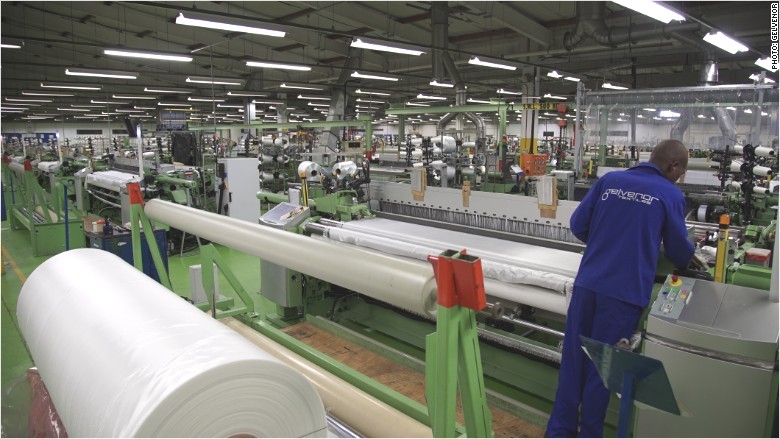Support enterprise growth to beat poverty, unemployment, Germany advises Africa
 Latest findings show both output and new orders continued to rise in July, extending the respective periods of expansion to 30 months.
Latest findings show both output and new orders continued to rise in July, extending the respective periods of expansion to 30 months.
Germany believes more direct business to business cooperation between German and African firms could deliver growth and lift people out of poverty faster than the current government to government model that is premised on funding for large public projects.
Speaking during a recent edition of the Uganda Private Sector Forum in Kampala, Mr. Andreas Lammel, the chair of the Economics and Energy Committee in Germany’s parliament, the Bundestag, said the federal government sees direct cooperation between African and German firms as a faster vehicle for addressing poverty and unemployment in Africa.
“Crucial choices have been made for a realignment of German policy on Africa. Supporting economic development in Africa, particularly by promoting trade, private-sector investment and innovation, is a key part of this policy and is underpinned by a wide range of measures. One feature of these measures is that they enlist German companies and assist them in their engagement in Africa,” Lammel told the forum that explored ways in which the private sector could contribute to inclusive development in Uganda.
Lammel observed that unless private firms grow, governments will be starved of revenues to support public works while unemployment will throw large section of the population into poverty.
“Promoting private enterprise is one of the main instruments for reducing structural poverty, promoting employment and harnessing indigenous resources. Private businesses create employment and income. Their tax payments provide a sound basis for effective public authorities,” he said.
He observed that with up to 20 million youth joining the labour market annually, Africa is not generating enough jobs to absorb its rapidly expanding labour pool because private firms are not expanding fast enough. According to current economic performance, only 100 million jobs at most, will have been created by 2030.
However, faster growth of small, medium and large enterprises through innovation and improved access to capital through tie-ups with foreign firms could support faster job creation, Lammel argues.
He adds that collaboration with German business will be productive because the African private sector is generally characterised by low productivity, limited competitiveness and a lack of diversification.
“Much of it comprises informal microenterprises and small businesses. There is a yawning productivity gap between small and large companies, considerably wider than in the industrialised nations. At the same time, few small businesses grow to become medium-sized or large enterprises,” he said.
Shortfalls in the infrastructure, access to capital and in the education system are some of the reasons for the flagging competitiveness of African SME’s. African banks are reluctant to lend money to private businesses, preferring to invest in government projects while unfavourable political and legal conditions, a lack of access to public and private services and insufficient interaction between government and business are obstacles to companies, he said.
Lammel says that with investment in value addition Africa’s agricultural sector which accounts for between 30 and 40 percent of GDP and employs two thirds of the labour force, could absorb yet more labour.
“There is great potential for job creation further down the production chain, namely in the processing and refinement of agricultural products. Few of the processed foods consumed in Africa are of African origin. Preserves, frozen foods, yogurt, fruit juices, chocolate – many of the goods that people can buy here in supermarkets and small local shops are imported from abroad – mainly Asia, Europe or the United States.
“Throughout Africa there are too few production plants that can turn tomatoes into ketchup, milk into cheese or maize and wheat into bread for supermarket shelves. In industrialised countries like the United States, the value added by subsequent links in the production chain is some 13 times higher than that of primary production, but the reverse applies in African countries, where the processing of farm products creates only 60 per cent of the income generated by agricultural production,” he said.
He cited Ethiopia which he said leads East Africa in food processing, with some 450 registered companies, mainly small businesses with 10 to 50 employees, producing food items, mainly edible oil, and flour or bakery products. Even here though, the majority of businesses are microenterprises that operate below industrial scale, generating small amounts of added value.
“The will to develop Africa’s own value-added chains and manufacture essential products locally is strong and German business can be the ideal partner in these efforts. Our companies and their products stand for cutting-edge technology and ‘Made in Germany’ quality. Our African partners appreciate the reliability and the long-term nature of our commitment. German companies, moreover, often train their staff locally in accordance with the dual system of vocational training and so create a vitally essential pool of local know-how” Lammel said.
He added that German businesses have been reluctant to venture into Africa in the past, partly because of the SME-dominated structure of the German economy.
“Compared with multinational giants, German SMEs have fewer means of identifying, spreading and managing risks. Small and medium-sized businesses face a formidable challenge when it comes to funding what are often lengthy lead times before deals are concluded. In these situations German businesses need political support,” he said.
To support the new model however, African countries will need to invest in high-quality basic and tertiary education.
“In addition, improved opportunities for training in manual trades and in technical and white-collar occupations – ideally with a highly practical focus – will provide young Africans with the prospect of earning a livelihood. The German dual system, combining part-time education with on-the-job training, could serve as a model in this respect. “
Mathias Kamp, the Konrad Adenauer Foundation country director for Uganda and Southern Sudan, said the days of simply looking at supporting government initiatives and large government projects as the basis for development cooperation were ending.
“These days, we have a lot more proponents talking about new ways of development cooperation and especially looking at how we can directly support the private sector and how we can link the private sector in Uganda and in Germany.
“A vibrant private sector is at the heart of a successful economy and is a key factor for inclusive development,” said.

 African Heads of state head to South Korea next week for Summit talks
African Heads of state head to South Korea next week for Summit talks
 Trading leads as main source of income for Ugandans
Trading leads as main source of income for Ugandans
 Unpacking results-based financing: balancing strengths with weaknesses
Unpacking results-based financing: balancing strengths with weaknesses
 Women social entrepreneurs offered chance to visit New York
Women social entrepreneurs offered chance to visit New York
 Why and how economics must change
Why and how economics must change
 Stanbic Bank Uganda Chief Executive elevated to regional role in Nairobi
Stanbic Bank Uganda Chief Executive elevated to regional role in Nairobi
